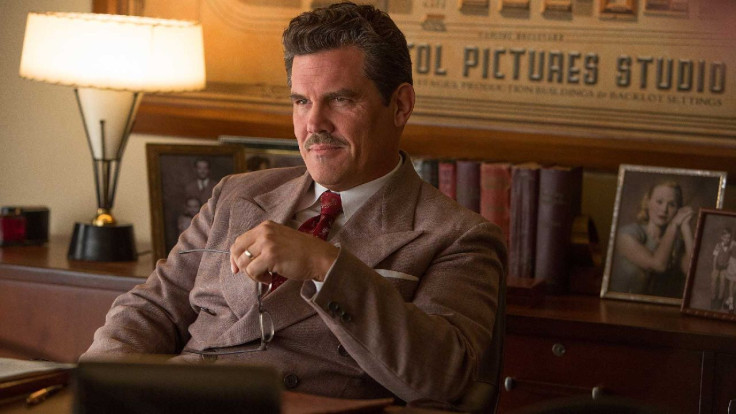If Hail, Caesar! is more than a collection of 50s era Hollywood homages it comes down to Eddie Mannix, Josh Brolin’s enigmatic Hollywood fixer. Throughout Hail, Caesar! we see Mannix work through petty celebrity PR problems with the constancy of a Carthusian monk. Insert shots of Eddie’s watch steal more screentime than much of the cast. Hail, Caesar!’s scattered genre vignettes orbit around his constancy.
Hail, Caesar! is a Coen farce in line with Burn After Reading, The Ladykillers and Intolerable Cruelty (better than those latter two). Barely concerned with the kidnapping of Hollywood star Baird Whitlock (George Clooney), Hail, Caesar! is much more about exploring every facet of the 1950’s studio system, the tension between its higher aspirations and mundane concerns forming the real bedrock.
‘Hail, Caesar!’ Trailer
The Coen Brothers love both the pageantry and the mundanity, as the Hollywood process reshapes both the well-intentioned and the lazy.
On one sound stage director Laurence Laurentz (Ralph Fiennes) gets his pomposity popped when a new lead is forced on him by the studios. On another, a small army of extras lounge around in phony revelry for an indifferent director more determined to keep the shot to a single take than inject any energy into the overdressed Roman bacchanal.
#RalphFiennes teaches his actors a thing or two in the Coen brothers’ #HailCaesar. Tickets: https://t.co/sZHCl3g1vWhttps://t.co/StOupkfgI5
— Hail, Caesar! (@HailCaesarMovie) February 5, 2016
But then there’s Channing Tatum busting out a blockbuster dance number. Or the meticulous composition of DeeAnna Moon (Scarlett Johansson) rising from the water.
Practical (or merely economical), studio compromises are usually shown as bad, endlessly pulling down auteurs and writers struggling to force something good through the machinery. But Hail, Caesar! expresses a fondness for that conflict, the pressures squeezing out charmingly cheap effects, indifferent earnestness and forced talent collisions that spark movie magic, like squeezing cowboy stunt star Hobie Doyle (Alden Ehrenreich) into a tuxedo.
Brolin’s Mannix oversees it all, the dross and the jewels, lubricating the productions with grinding effort. Hail, Caesar! opens on Mannix in a confessional, wracked with guilt over a few snuck cigarettes, but he’s more penitent than truly religious.
In one of Hail, Caesar!’s best scenes, Mannix sits down with two priests, a pastor, and a rabbi to evaluate the potential offensiveness of their Ben Hur epic, Hail, Caesar! A Tale of the Christ. As they bicker over the nature of the Godhead, Mannix administers with philosophical indifference.
The religious questions are just another check on the to do list, no more weighty than juggling the twin gossip columnists, Thora and Thessaly Thacker (Tilda Swinton, saddled with some of the Coens’ most unfunny material ever).
This solidity immediately makes him less compelling than the Coens’ more mercurial protagonists, like Llewyn, H.I., Tom Reagan, Larry Gopnik and Barton. And with so much of Hail, Caesar! taken up with dance numbers, aquatic fantasies, and smirking The Lady Eve tête-à-têtes, less of Mannix’s interior life is explored than with Marge Gunderson, Ed Tom Bell, Mattie Ross, The Dude and other exemplars of that other major Coen Bros. type: moral rocks that chaos swirls around.
But while Mannix’s stoicism never feels forceful enough to fully counterbalance the silliness surrounding him, Hail, Caesar! earns its moral and dramatic weight by placing it on his shoulders.
Compared to the Soviet infiltrators Baird gets mixed up with, Mannix’s central conflict feels vanishingly small: will he accept a job with Lockheed and abandon Hollywood? Yet the question takes on a religious and ethical dimension as Mannix finds himself squeezed between the temptations of responsibility: is it more moral to shoulder h-bomb Armageddon or continue bribing cops to keep starlets out of the gossip columns?
Mannix’s decision takes on the weight of revelation--early on he is confronted with a cinematic vision of Saul’s revelation on the road to Damascus--enriching what would otherwise be the Coen Brothers’ version of weightless fluff. Hail, Caesar! has a thousand small pleasures, but whether they cohere will depend on how much you’re willing to invest in the quiet, tightly-wound man at its center.


















